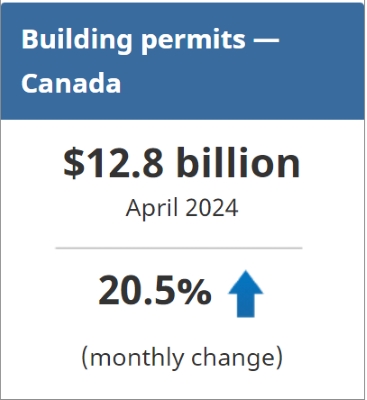Statistics Canada: Building Permits, April 2024

Month over month, the total value of building permits in Canada significantly increased 20.5% to $12.8 billion in April. Construction intentions in the residential sector increased 21.0% to $8.0 billion and the non-residential sector rose 19.6% to $4.8 billion, with growth observed in all components. British Columbia posted a record high monthly total value of building permits ($3.1 billion), leading the monthly increases in both residential and non-residential sectors in Canada.
On a constant dollar basis (2017=100), the total monthly value of building permits grew 20.7% in April, to the highest level since June 2023.
Record high levels in British Columbia’s multi-unit residential construction intentions
The value of residential building permits increased 21.0% to $8.0 billion in April 2024. The growth in the residential sector was driven by record high levels in the multi-unit component, increasing 32.6% to $5.4 billion, while the single-family home component edged up 2.4% to $2.6 billion.
British Columbia (+75.2%; +$796.3 million) led the growth in the multi-unit component, reaching a record high of $1.9 billion in April, surpassing the previous peak of $1.5 billion in June 2023. In April 2024, Ontario (+31.9%; +$442.9 million) also supported the monthly growth in the component. Overall growth was driven by several significant permits issued for multi-unit construction projects in the cities of Toronto, Ontario; Surrey, British Columbia; and Coquitlam, British Columbia.
Across Canada, 4,300 new single-family homes were authorized in April. Meanwhile, 22,600 new multi-unit dwellings were also approved through building permits, an all-time high. British Columbia’s record 7,200 new multi-unit dwellings authorized in April greatly contributed to this movement.
Despite a strong month, the 12-month cumulative total of 267,700 units authorized from May 2023 to April 2024 saw little change, increasing by 200 (+0.1%) units compared to the 267,500 units authorized from May 2022 to April 2023.
British Columbia drives growth in the non-residential sector
The value of non-residential permits increased 19.6% to $4.8 billion in April 2024, with growth in the commercial (+21.3%; +$470.7 million), institutional (+17.7%; +$191.5 million) and industrial (+17.4%; +$126.0 million) components. Broad-based growth in British Columbia (+149.9%; +$605.6 million) drove the increase in the non-residential sector in Canada.
To explore data using an interactive user interface, visit the Building permits: Interactive Dashboard.
For more information on construction, please visit the Construction statistics portal.
For more information on housing, please visit the Housing statistics portal.
Note to readers
Unless otherwise stated, this release presents seasonally adjusted data with current dollar values, which facilitate month-to-month and quarter-to-quarter comparisons by removing the effects of seasonal variations. For information on seasonal adjustment, see Seasonally adjusted data – Frequently asked questions.
Building components
- Single-family dwellings: Residential buildings containing only one dwelling unit (e.g., single-detached house, bungalow, linked home [linked at the foundation]).
- Multi-family dwellings: Residential buildings containing multiple dwelling units (e.g., apartment, apartment condominium, row house, semi-detached house).
- Industrial buildings: Buildings used in the processing or production of goods or related to transportation and communication.
- Commercial buildings: Buildings used in the trade or distribution of goods and services, including office buildings.
- Institutional and government buildings: Buildings used to house public and semi-public services, such as those related to health and welfare, education or public administration, and buildings used for religious services.
Revision
Data are subject to revisions based on late responses, methodological changes and classification updates. Unadjusted data have been revised for the previous month. Seasonally adjusted data have been revised for the previous three months.
For information on trend-cycle data, see the page Trend-cycle estimates – Frequently asked questions.
Next release
Data on building permits for May will be released on July 12.
Source: Statistics Canada







